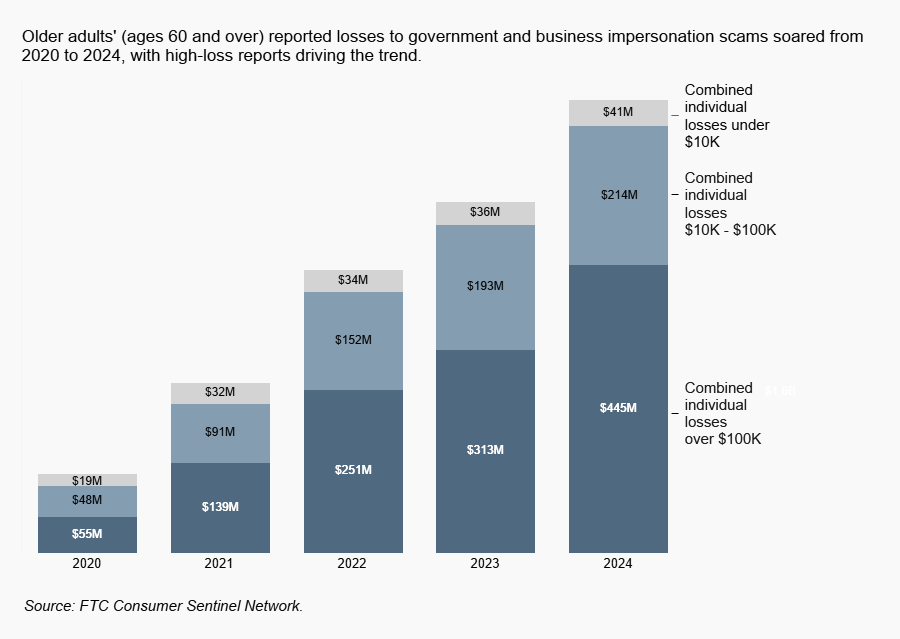Retirees’ Lifelong Savings Under Siege by Scammers, FTC Warns

A new analysis from the Federal Trade Commission spotlights a disturbing surge in scams targeting older Americans, with retirees increasingly falling prey to fraudsters impersonating trusted businesses and government agencies to steal their life savings.
The FTC report reveals a sharp escalation in high-dollar impostor scams over the past four years. Reports from victims aged 60 and older who lost at least $10,000 have quadrupled from 2020 to 2024.
Even more alarming, the number of reports involving losses over $100,000 has jumped nearly sevenfold in that time, while total combined losses in that category soared eightfold.
The manipulative ‘false alarm’ playbook
Scammers exploit fear and urgency with carefully crafted lies:
Fake account alerts – claiming suspicious activity from banks or retailers like Amazon.
Criminal involvement – asserting a victim’s Social Security Number is tied to serious offenses such as money laundering.
Bogus tech warnings – through pop-up security alerts impersonating Microsoft or Apple, urging victims to “call for help.”
These stories culminate in instructions to move money to “protect” it – transfer funds, deposit cash into Bitcoin ATMs, or hand off valuables to couriers – none of which legitimate agencies would ever request.
The phone call trap
Although scams can begin online, the FTC emphasizes that phone calls remain the primary method for completing the deception.
“Lots of scams are now carried out online, but these scams still depend on a phone call,” the memo warns. “Even when they don’t start with a call, reports show the goal is to get you on the phone. A call is still the best way to dial up the fear and the urgency so it’s harder for you to think clearly and check things out. Keeping you on the phone is also designed to keep you from talking to anyone who could help – a friend or family member in a calmer state of mind who might see through the lies.”
In 2024, 41% of high-loss cases began with a call, 15% via pop-up or ad, and 13% via email. The caller’s intent: to keep victims isolated and emotionally manipulated, avoiding input from trusted friends or family.

Don’t take the bait
To guard against these scams, the FTC advises:
· Never move money in response to unexpected outreach, even if the caller claims it’s to safeguard your assets
· Hang up and verify – use known, legitimate contact channels; do not rely on phone numbers or links provided by the caller
· Block unwanted calls proactively to reduce exposure
As scammer tactics evolve, older adults remain particularly vulnerable. Fraudsters are exploiting both trust and urgency to devastating financial effect.
Last month, a Hillsborough County woman was conned out of $15,000 after scammers cloned her daughter’s voice to fake a desperate call for help after a fabricated car crash. The incident has drawn national attention, spotlighting the growing danger of AI-powered voice scams.
Read: Florida Woman Loses $15K to AI Voice Scam Mimicking Daughter in Distress
If you’re even slightly uncertain after a call or message, pause and verify. Most importantly, talk it over with someone you trust.
Consider using Scamio if you’re ever suspicious of a certain phone call, email, or text message. Our clever chatbot is designed specifically to combat socially engineered fraud attacks. Simply describe the situation to Scamio and let it guide you to safety.
Finally, make it a habit to stay informed about the latest scams. Regularly educate yourself on emerging threats and teach your family and colleagues to do the same. Read up on the cyber news to know what scammers exploit as technology constantly evolves.
You may also want to read:
Outwit the Swindlers: How to Spot Sophisticated Scams Online
‘Mom, I Crashed the Car!’: Scammers Clone Son’s Voice to Ask Parents for $15,000 Bailout
tags
Author
Filip has 17 years of experience in technology journalism. In recent years, he has focused on cybersecurity in his role as a Security Analyst at Bitdefender.
View all postsYou might also like
Bookmarks
